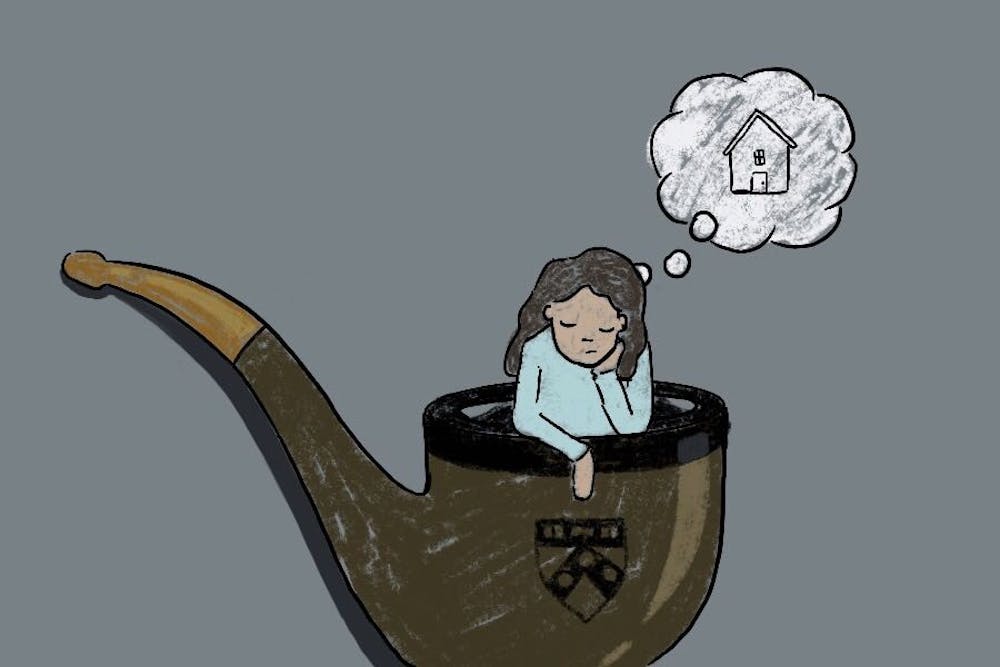I got no sleep the night before moving into college. Instead, I spent those seven hours silently sobbing into the white comforter of a twin–sized bed, timing my breaths so my mother wouldn’t stir from the other room of the Airbnb.
The year before, I had purposefully staked my claim in Penn’s early applicant pool for the sake of getting denied early—to ensure I would finally be able to process realistic college options over winter break. When I submitted my application on the first of November, the rest of the teenagers who crowded into my English teacher’s room during lunch break all burst into applause. Students from my rural town in Central California rarely applied to Common App colleges, let alone Ivy League universities.
During my first semester at Penn, I encountered many people who described their application decision as the moment when everything fell into place—each trashed draft of their Common App essay felt validated when their parents saw the congratulatory video flash onto the screen.
I opened my decision alone. I sat there, startled when the fight song played through my computer speakers. The first three numbers I dialed to relay my disbelief went straight to voicemail.
But as the days passed, so did the glow from my acceptance. Relatives and classmates exhausted their pool of congratulatory messages, and I began telling people I was “going to school out of state” to prevent any more.
I romanticized this seemingly impossible dream for years to remedy small–town boredom, but I didn’t plan to shape my life around it. Planning plane tickets and finding thick winter coats became more daunting than picking out first semester classes. I no longer anticipated nights spent in Gothic–style libraries and afternoons in city cafes. Not going to Penn seemed like wasting a future. Attending it, at times, felt scarier.
As a seventeen–year–old girl who already secured her spot as the top in her class, there was no need to do schoolwork. No need to go to dances or attend club meetings. My insomnia translated from hours of history homework to hours of staring blankly at my computer screen before crashing in last night’s makeup. I got coffee three times a day just to fill time and skipped afternoon classes hiding in my bathtub. Life felt transitory. I would be heading to an entirely foreign world in a matter of months, and all I wanted to do was stay in my front yard.
I compiled the salvageable remnants of my childhood into three suitcases and flew across the country, edging closer towards what I was most afraid of. My parents and I strolled through an Ikea in New Jersey filled with excited chatter from other incoming freshmen. The pink bedding and storage boxes strewn across my cramped dorm room the next morning made me feel hollow. I didn’t let my mother hang more than two shirts up in my closet before urging her and my father to the parking garage.
I found out that going to college doesn’t blur out the blots you’ve carried your entire life. There is no perfect group of people waiting to give you the experiences you’ve daydreamed about, and beautifully–designed buildings can’t fix your depression. It takes a lot more than a random roommate assignment to do that.
After spending the first half of the year mostly alone by choice, I struggled to make authentic connections with others. I invested every ounce of emotion I had into 3 a.m. conversations with people on my floor, causing me to skip classes. I went out on Saturday nights forging false intimacy in friendships I thought would be valuable. In a struggle to brand myself as a college student, I forgot who I really was.
When I returned home for fall break, my best friend and I sat in an In–N–Out parking lot for twenty minutes before either of us spoke a word.
“This feels weird,” she said. It was.
Our town felt the same, but I had adopted this identity as a Penn student, and felt out of place.
There was no epiphany where I realized I was unhappy. Everything for a while felt so unfamiliar, and I didn’t know how I was supposed to feel—just what I was supposed to be doing. Winter break edged closer, and my friends and I exchanged awkward party encounters and meaningless conversations like trading cards. The parts of my personality I clung to in May were slowly disappearing, and as January arrived, I wondered if I would ever be content.
Once again, I was wrong. Slowly, my entire experience changed. Late night conversations came after hours of studying in Quad lounges with a girl from calculus lecture—the girl whose room I moved into a month later. To fulfill a credit requirement, I returned to jazz after years of performing, and fell in love with Monday mornings over Brubeck and Armstrong. My weekends were defined by on–campus performances and downtown dinners rather than parties. I took in memories—the type I still turn over before going to bed, the way I once turned over getting into Penn.
There’s no perfect conclusion to this identity crisis of sorts. Some days I still wake up and struggle to remember that a philosophy class is worth something. I am, however, learning to be kinder to myself. I now know it’s not my fault that half the students in my class are better prepared at the start of the semester due to their high school. And I know there is more to these four years than seeking attention from anyone who is willing to listen.
There is a place here for my late–night poetry I force friends to read, for my detailed chemistry notes and outlandish jazz opinions. For spontaneous trips to Delaware with my best friend, and for articles I write for this magazine. There is a home for me in a city I had never visited, in an school where I didn’t think I belonged.







